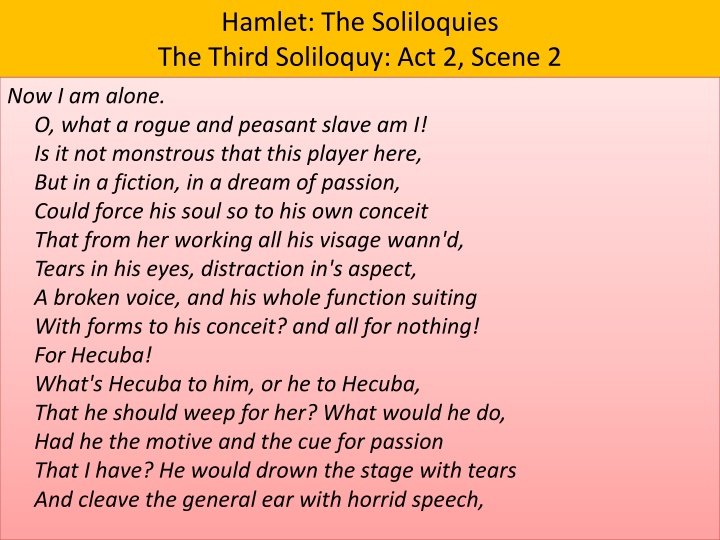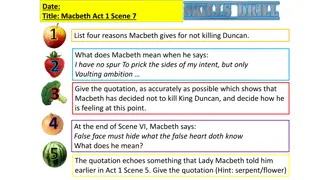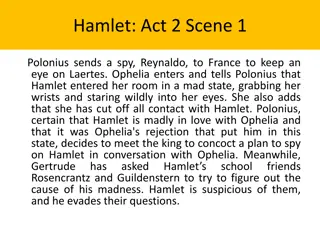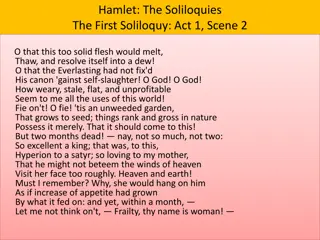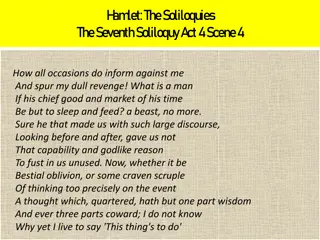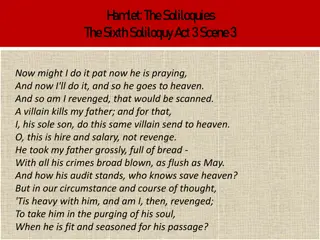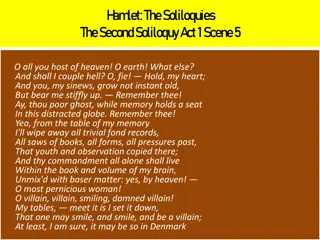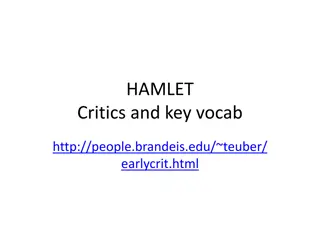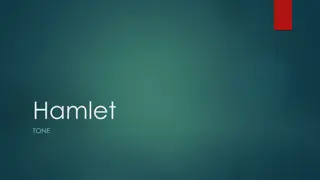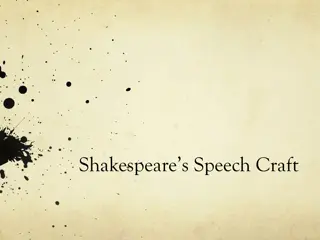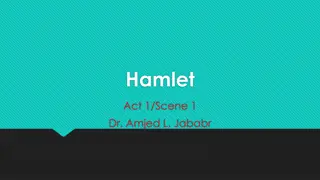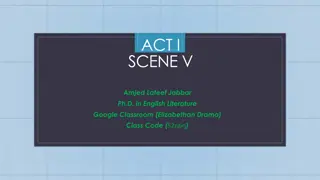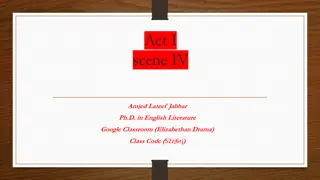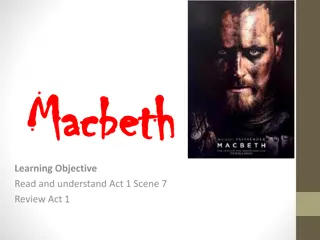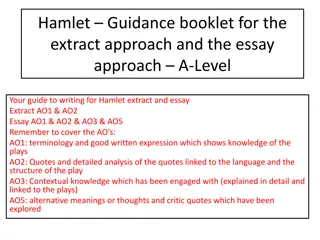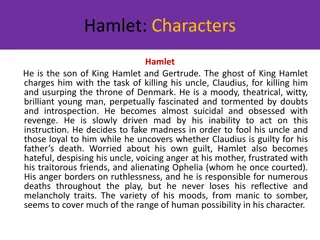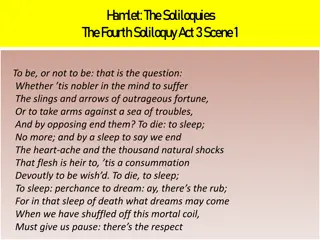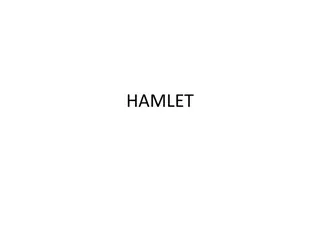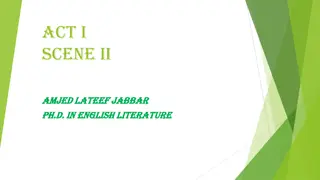Hamlet: The Third Soliloquy from Act 2, Scene 2
Hamlet contemplates his own indecision and lack of action in seeking revenge for his father's murder. He questions the player's ability to feel deeply for a fictional character and expresses his frustration at his own inaction. Through introspection, he resolves to use a play to uncover the truth and spur himself to action.
Download Presentation

Please find below an Image/Link to download the presentation.
The content on the website is provided AS IS for your information and personal use only. It may not be sold, licensed, or shared on other websites without obtaining consent from the author.If you encounter any issues during the download, it is possible that the publisher has removed the file from their server.
You are allowed to download the files provided on this website for personal or commercial use, subject to the condition that they are used lawfully. All files are the property of their respective owners.
The content on the website is provided AS IS for your information and personal use only. It may not be sold, licensed, or shared on other websites without obtaining consent from the author.
E N D
Presentation Transcript
Hamlet: The Soliloquies The Third Soliloquy: Act 2, Scene 2 Now I am alone. O, what a rogue and peasant slave am I! Is it not monstrous that this player here, But in a fiction, in a dream of passion, Could force his soul so to his own conceit That from her working all his visage wann'd, Tears in his eyes, distraction in's aspect, A broken voice, and his whole function suiting With forms to his conceit? and all for nothing! For Hecuba! What's Hecuba to him, or he to Hecuba, That he should weep for her? What would he do, Had he the motive and the cue for passion That I have? He would drown the stage with tears And cleave the general ear with horrid speech,
Hamlet: The Soliloquies The Third Soliloquy: Act 2, Scene 2 Make mad the guilty and appal the free, Confound the ignorant, and amaze indeed The very faculties of eyes and ears. Yet I, A dull and muddy-mettled rascal, peak, Like John-a-dreams, unpregnant of my cause, And can say nothing; no, not for a king, Upon whose property and most dear life A damn'd defeat was made. Am I a coward? Who calls me villain? breaks my pate across? Plucks off my beard, and blows it in my face? Tweaks me by the nose? gives me the lie i' the throat, As deep as to the lungs? who does me this?
Hamlet: The Soliloquies The Third Soliloquy: Act 2, Scene 2 Ha! 'Swounds, I should take it: for it cannot be But I am pigeon-liver'd and lack gall To make oppression bitter, or ere this I should have fatted all the region kites With this slave's offal: bloody, bawdy villain! Remorseless, treacherous, lecherous, kindless villain! O, vengeance! Why, what an ass am I! This is most brave, That I, the son of a dear father murder'd, Prompted to my revenge by heaven and hell, Must, like a whore, unpack my heart with words, And fall a-cursing, like a very drab, A scullion!
Hamlet: The Soliloquies The Third Soliloquy: Act 2, Scene 2 Fie upon't! foh! About, my brain! I have heard That guilty creatures sitting at a play Have by the very cunning of the scene Been struck so to the soul that presently They have proclaim'd their malefactions; For murder, though it have no tongue, will speak With most miraculous organ. I'll have these players Play something like the murder of my father Before mine uncle: I'll observe his looks; I'll tent him to the quick: if he but blench, I know my course. The spirit that I have seen May be the devil: and the devil hath power To assume a pleasing shape; yea, and perhaps Out of my weakness and my melancholy, As he is very potent with such spirits, Abuses me to damn me: I'll have grounds More relative than this: the play 's the thing Wherein I'll catch the conscience of the king.
Hamlet: The Soliloquies The Third Soliloquy: Act 2, Scene 2 The third soliloquy is inspired by The Player s moving declamation. It shows Hamlet's continued inability to do anything of consequence. He lacks the knowledge of how to heal the pain caused by his present circumstances. He promised his father's ghost to act swiftly to avenge his murder, but he has not done anything. So he wonders how an actor would portray him, saying, '[he would] drown the stage with tears'.
Hamlet: The Soliloquies The Third Soliloquy: Act 2, Scene 2 He wonders if he is a coward, since he does not cleave the general ear with horrid speech or make mad the guilty and appal the free . He asks, who calls me villain? , but the only person speaking is himself. At this point, he is accusing himself of villainy for not speaking on behalf of his dear, recently-deceased, father.
Hamlet: The Soliloquies The Third Soliloquy: Act 2, Scene 2 He seeks revenge upon his remorseless, treacherous, lecherous, kindless , uncle, but he only complains and accomplishes nothing. He criticizes his own inaction, calling himself 'scullion', 'whore', and 'drab' for not doing more; for saying nothing about a king, upon whose property and most dear life a damned defeat was made ; for not killing Claudius and feeding his innards to the kites.
Hamlet: The Soliloquies The Third Soliloquy: Act 2, Scene 2 He next returns to an idea that had crossed his mind earlier -- that of staging the play The Mousetrap. Hamlet is convinced that, as Claudius watches a re-enactment of his crime, he will surely reveal his own guilt.
Hamlet: The Soliloquies The Third Soliloquy: Act 2, Scene 2 Hamlet cannot take the word of his father's ghost, who really might be "the devil", tricking him into damning himself. Thus, he must have more material proof before he kills Claudius -- he must "catch the conscience of the king."
The End See you next time!
